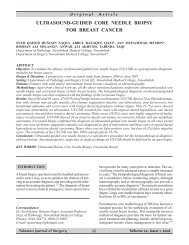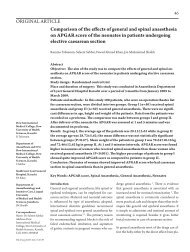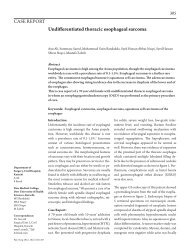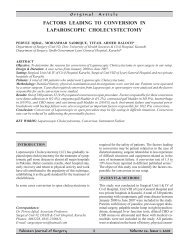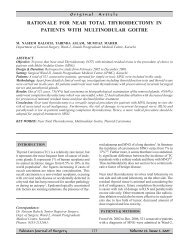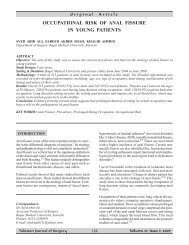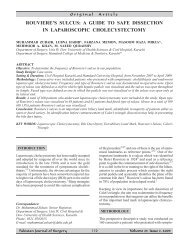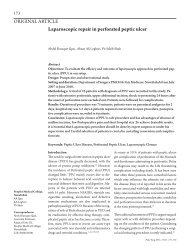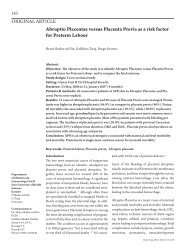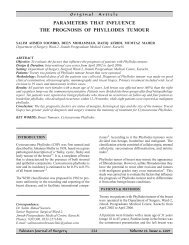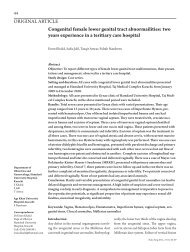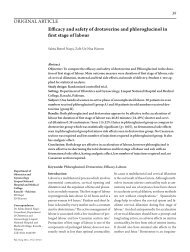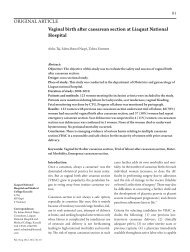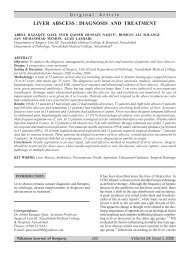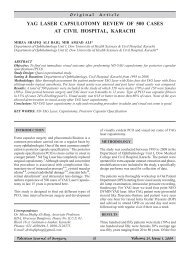14-Case Postponed.FH10 - Pakistan Journal Of Surgery
14-Case Postponed.FH10 - Pakistan Journal Of Surgery
14-Case Postponed.FH10 - Pakistan Journal Of Surgery
You also want an ePaper? Increase the reach of your titles
YUMPU automatically turns print PDFs into web optimized ePapers that Google loves.
Original<br />
Article<br />
CASE POSTPONED - ONE YEAR SURGICAL AUDIT OF A SINGLE<br />
UNIT IN A GOVERNMENT HOSPITAL<br />
SHEERAZ SHAKOOR SIDDIQUI, SAEED AHMED, SHAFIQ-UR-RAHMAN<br />
Department of <strong>Surgery</strong>, Unit III, Dow University of Health Sciences & Civil Hospital, Karachi<br />
ABSTRACT<br />
Objective: To describe the causes for last minute cancellation of elective surgical operations in a single general<br />
surgical unit at Civil Hospital Karachi.<br />
Study Design: Descriptive observational.<br />
Setting & Duration: Department of <strong>Surgery</strong> Unit III, Civil Hospital, Karachi from January till to December 2008.<br />
Introduction: Cancellation of elective surgeries is a major drain on health resources. Identifying its causes can<br />
help streamline operating lists and improve efficiency of surgical team.<br />
Methodology: Operating lists from January till December 2008 of Surgical Unit III at CHK were audited. The files<br />
of postponed and cancelled cases were thoroughly reviewed to assess the causes of postponement.<br />
Results: The overall rate of postponement was 23.5%. Majority (63%) were postponed due to non-fitness for<br />
anesthesia. A significant number (29%) were cancelled due to organisational failures.<br />
Discussion: Most of the postponements can be avoided by undertaking a thorough assessment of patients in the preoperative<br />
clinics. There is also an emergent need to re-structure the standard rules and regulations in public sector<br />
hospitals to minimise organisational failures.<br />
KEYWORDS: Postponement, Elective Operation, Anaesthesia Fitness, Para-medical Staff<br />
INTRODUCTION<br />
Postponement/cancellation of an elective operation is<br />
a rare, but not unheard-of phenomenon in any surgical<br />
practice. However, an eleventh-hour cancellation is a<br />
disturbing event for all those involved i.e. surgeons,<br />
patients, and not the least for patients’ kith and kin.<br />
Any last-minute cancellation translates into wastage of<br />
Operating room time, the surgeons’ and para-medics’<br />
time, and, most of all, patients’ work-hours. It also<br />
engenders anxiety and a feeling of distrust on part of<br />
the patients. Overall, the phenomenon is a major drain<br />
on health resources.<br />
Correspondence:<br />
Dr. Sheeraz Shakoor Siddiqui, Assistant Professor,<br />
Surgical Unit III, Dow Medical College &<br />
Civil Hospital, Karachi.<br />
Phones: 0300-9288120.<br />
E-mail: drss_16@hotmail.com<br />
Cancellation of elective surgeries has been reported<br />
rather rarely in the international literature. The rates of<br />
cancellation range between 10 and 17%. 1 The overall<br />
rate in NHS hospitals, UK is 11%. 2 Zafar 3 from Ayub<br />
Teaching Hospital have quoted rates as high as 25%.<br />
Most of the western authors have found anesthesiarelated<br />
fitness issues to be the leading cause of cancellations.<br />
2-5 On the contrary, Zafar and colleagues 3 encountered<br />
‘organisational reasons’ (time and bed shortage)<br />
as the commonest cause.<br />
With a collective service of over 30 years in government<br />
hospitals, the authors have encountered this issue consistently,<br />
which raises significant queries as to the rootcause/causes<br />
of the problem. One is also prompted to<br />
speculate why such an endemic problem has so-far gone<br />
un-researched, since authors know from personal communication<br />
with colleagues that almost every surgeon<br />
working in public sector hospitals has experienced it to<br />
varying degrees.<br />
Civil Hospital Karachi is a main-stream tertiary care<br />
centre catering to the health-care needs of a significant<br />
195<br />
Volume 25, Issue 3, 2009
<strong>Case</strong> <strong>Postponed</strong> - One year surgical audit of a single unit<br />
S. S. Siddiqui, et al<br />
portion of the city. It has six functioning general surgical<br />
units, each getting three operating theatres twice weekly<br />
for elective surgeries. This accounts for a total operating<br />
time of almost 36 hours a week, considering the office<br />
hours in government hospitals to be 6 hours a day.<br />
The authors, after having faced the problem rather regularly,<br />
decided to undertake an audit of all the elective<br />
operating lists in our unit in order to analyse the causative<br />
factors of last-minute/same-day postponement of surgery.<br />
The objective was also to formulate some guidelines/<br />
code-of-conduct for the operating team, so that the<br />
problem could be minimised, if not eliminated altogether.<br />
METHODOLOGY<br />
Operating room data from January 1, 2008 till December<br />
31 2008 was retrieved from the data-base of Operation<br />
Theatre Complex of the Civil Hospital Karachi. The<br />
data-base records all elective operation lists, including<br />
patients name, age, the admitting unit with the bed<br />
number, proposed diagnosis, the operation/s performed,<br />
surgeon’s and assistants’ names. The data is recorded<br />
on the computer one day prior to the elective list and<br />
again after the execution of the operation. The final<br />
record thus provides documented evidence of postponement.<br />
It does not however give the reasons for cancellation/postponement<br />
of any operation.<br />
For the afore-mentioned duration, audit of the elective<br />
lists was undertaken. Patient records and files of all<br />
postponed operations were reviewed. The audit especially<br />
focussed on the notes of anaesthetist and surgical<br />
team in order to ascertain the cause of postponement.<br />
The data thus obtained was recorded on a proforma<br />
Table I. Summary of <strong>Postponed</strong><br />
elective operation (n=187)<br />
Name of Operation<br />
Inguinal Hernia Repair<br />
Lap Cholecystectomy<br />
perianal <strong>Surgery</strong><br />
Excision Biopsy<br />
Endoscopy<br />
Stoma Reversal<br />
Testicular <strong>Surgery</strong><br />
Others<br />
<strong>Postponed</strong><br />
39<br />
37<br />
28<br />
17<br />
10<br />
10<br />
10<br />
36<br />
%<br />
20.8<br />
19.7<br />
<strong>14</strong>.9<br />
9.0<br />
5.3<br />
5.3<br />
5.3<br />
19.2<br />
documenting the patients’ age, gender, known co-morbids,<br />
surgical diagnosis and potential reason/reasons<br />
for postponement. Frequencies mean (with range) and<br />
pie-charts were employed for elaboration of the results.<br />
RESULTS<br />
In the year 2008 surgical unit III undertook a total of<br />
97 elective lists. The total number of scheduled cases<br />
was 795 (average of 8 cases per list). <strong>Of</strong> these, 608<br />
patients got operated as per schedule, while the remaining<br />
187 were either postponed or cancelled. Thus the overall<br />
rate of postponement was 23.5% (1.92 cases per elective<br />
list).<br />
Frequency of <strong>Postponed</strong> Surgeries: (Table I).<br />
Inguinal hernia repair was the most frequently postponed<br />
operation (n=39), followed by laparoscopic cholecystectomy<br />
(n=37). Table I summarises the operations postponed<br />
in the year 2008.<br />
Co-morbid diseases in <strong>Postponed</strong> cases:<br />
Almost half the postponed patients had co-morbid<br />
diseases (n=98, 52.4%). <strong>Of</strong> these, <strong>14</strong> were diagnosed<br />
on-table by the anesthesia team. Table II summarises<br />
the co-morbidity in the postponed operations.<br />
Reasons for Postponement:<br />
Three main categories of the reasons were identified;<br />
vis.<br />
1) Unfit status for anestheisa (general/spinal)<br />
2) Organisational reasons<br />
3) Patients’ refusal/disappearance<br />
1) Non-fitness for Anesthesia: This constituted the<br />
biggest group with 117 patients being postponed<br />
after being rendered unfit for anesthesia. Table III<br />
Table II. Co-morbidity in <strong>Postponed</strong><br />
elective operation (n=98)<br />
Co-morbid disease<br />
Hypertension only<br />
HTN + IHD<br />
IHD<br />
Diabetes<br />
COPD/asthma<br />
Cirrhosis<br />
No.<br />
30<br />
28<br />
16<br />
12<br />
7<br />
5<br />
%<br />
16.0<br />
<strong>14</strong>.9<br />
8.5<br />
6.4<br />
3.7<br />
2.6<br />
196<br />
Volume 25, Issue 3, 2009
<strong>Case</strong> <strong>Postponed</strong> - One year surgical audit of a single unit<br />
S. S. Siddiqui, et al<br />
summarises the main reasons given by anesthesia<br />
team for their decision. The most common investigation<br />
asked for by the anesthesia team, and missing<br />
from the pre-operative work-up, was coagulation<br />
profile (18 out of 45 patients postponed for this<br />
reason); while the most common investigation found<br />
abnormal was serum electrolytes (21 of the 40 patients<br />
postponed for uncorrected profiles).<br />
2) Organisational reasons: As many as 54 patients<br />
were postponed due to unavailability/shortage of<br />
para-medical staff. The commonest reason found<br />
was flat refusal by the technicians because “duty<br />
times were over”; this accounted for 20% of all<br />
postponements (n=38). Other reasons of unavailability<br />
included ‘strikes’, ‘social occasions’ and overall<br />
political unrest in the city.<br />
3) Disappearance/Refusal by the Patients: Six percent<br />
cases (n=12) were postponed because the patients<br />
either refused to get operated or disappeared altogether<br />
at the eleventh hour. No further reasons were<br />
identified in this group.<br />
No reason for postponement could be identified in the<br />
remaining four patients due to incomplete records. Table<br />
IV sums up the causes of postponement.<br />
DISCUSSION<br />
Postponement of elective operations is a multi-factorial<br />
phenomenon. It has implications for all arms of the<br />
health care system Vis. Surgeons, para-medics and the<br />
patients. Minimising cancellations and postponements<br />
can improve efficiency and lead to a more effective use<br />
of operating room time, besides restoring trust in the<br />
doctor-patient relationship.<br />
Table III. Reasons cited by anaesthesis team for<br />
postponment of elective surgeries (n=117)<br />
Reason Given<br />
uncontrolled hypertension<br />
Incomplete investigation<br />
Abnormal &<br />
uncorrected investigation<br />
Chest infection<br />
Missing “Pre-op” form<br />
Multiple reasons<br />
Incomplete NPO<br />
No.<br />
27<br />
25<br />
20<br />
18<br />
16<br />
8<br />
3<br />
Percentage of<br />
postponed case<br />
<strong>14</strong>.4<br />
13.3<br />
10.6<br />
9.6<br />
8.5<br />
4.2<br />
1.6<br />
The rates of cancelled operations from the west are<br />
well below those in our study and that reported from<br />
Ayub Hospital. 3 Chamisa from Durban 4 and Rai from<br />
Oxford, UK 2 have reported as low rates as 5%. The<br />
overall working system of most western hospitals is in<br />
marked contrast to the public sector hospitals of <strong>Pakistan</strong>.<br />
This is especially true of the working hours, the paramedical<br />
support staff and the organisation of workload.<br />
These key factors are nonetheless responsible for<br />
the afore-mentioned marked gap in figures of<br />
cancellations.<br />
The majority of our cases were postponed due to anesthesia-fitness<br />
issues, similar to what has been reported<br />
by Chamisa 4 , Eldas 5 and Zafar. 3 Most of our patients<br />
did have a pre-operative form attached to the files, thus<br />
showing that they had been assessed in the anesthesia<br />
clinic. While there is a system for pre-operative workup<br />
and anesthesia fitness clinic in place, it is quite often<br />
overloaded, catering to all the six general surgical wards<br />
as well as sub-specialities. The idea of a nurse-led preassessment<br />
followed by consultants’ evaluation in this<br />
regard seems worthwhile 2 , since it filters off patients<br />
with unremarkable profiles thereby saving time for a<br />
more thorough assessments of the remarkable ones.<br />
Organisational failure accounted for 29% of cancellations.<br />
Zafar 3 has reported ‘time shortage’, ‘bed shortage’<br />
and ‘unavailability of anesthetist’ as factors accounting<br />
for more than half of cancellations. From the west, Sanjay<br />
6 found 16% cancellations happening due to ‘overrunning<br />
lists’. However, none has reported on the factor<br />
that we encountered as contributing to most organisational<br />
failures, namely unavailability of the para-medical<br />
staff. Operating room technicians are a most essential<br />
component of any surgical practice. Unfortunately,<br />
neither the rules and regulations of the Hospital nor<br />
those of the Ministry make it binding on them to assist<br />
in completion of a scheduled list. In other words, they<br />
are completely justified in refusing to assist if working<br />
hours are over. Needless to say, it is high time that some<br />
kind of a work ethic is codified for tech-nical theatre<br />
staff by the Ministry of Health. On the other hand, the<br />
ideas of incentives and over-time stipends should also<br />
be implemented at policy-making level. Only 6% cancel-<br />
Table IV. Reasons for postponment<br />
Cause for<br />
Postponement<br />
Non Fitness for anaesthesia<br />
Organisational reason<br />
Patient Refusal<br />
No.<br />
117<br />
54<br />
12<br />
Percent<br />
cases<br />
62.5<br />
28.8<br />
6<br />
197<br />
Volume 25, Issue 3, 2009
<strong>Case</strong> <strong>Postponed</strong> - One year surgical audit of a single unit<br />
S. S. Siddiqui, et al<br />
lations were due to patient refusal or disappearance.<br />
Sanjay 6 found 12% cancellations due to patient refusal,<br />
while Chamisa 4 has reported only 1.8% due to this<br />
cause. A further analysis of reasons for patient refusal<br />
is required to extrapolate this particular factor.<br />
CONCLUSION<br />
Postponement of elective operations is responsible for<br />
significant wastage of resources. Meticulous pre-operative<br />
work-up and stream-lining of operating room protocols<br />
can minimize this loss.<br />
REFERENCES<br />
1. Aaserud M, Trommald M, Boynton J. Elective<br />
surgery-cancellations, ring fencing and efficiency.<br />
Tidsskr Nor Laegeforen 2001; 121: 2516-9.<br />
2. Rai M R, Pandit J J. Day of surgery cancellations<br />
after nurse-led pre-assessment in an elective surgical<br />
centre: the first 2 years. 2003; 58(7): 692-9.<br />
3. Zafar A, Mufti T S, Griffin S, Ahmed S, Ansari J<br />
A. Cancelled elective general surgical operations<br />
in Ayub Teaching Hospital. Journ Ayub Med Coll<br />
Abbottabad 2007; 19: 64-6.<br />
4. Chamisa I. Why is surgery cancelled? A retrospective<br />
evaluation. S Afr Journ Surg 2008; 46: 79-81.<br />
5. Eldas S D, Aslan F E. The reasons for postponement<br />
of scheduled orthopedic surgical operations and its<br />
effect on the patients' anxiety and pain levels.<br />
2004; 38(3): 212-9.<br />
6. Sanjay P, Dodds A, Miller E, Armugam P J, Woodward<br />
A. Cancelled elective operations: an observational<br />
study from a district general hospital. J Health<br />
Organ Manag 2007; 21: 54-8.<br />
198<br />
Volume 25, Issue 3, 2009



